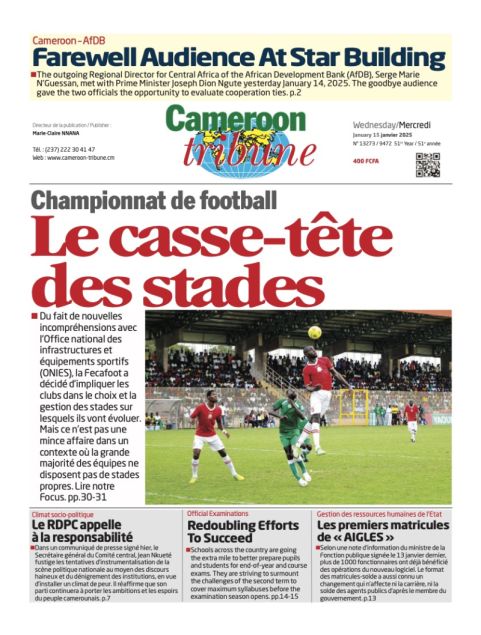Land matters have remained some of the most conflictual concerns across the country over the years. This has partly been the result of the increasing value of land either due to demographic growth or its geographical location. For instance, Fako Division in the South West Region has recently come under bad publicity as a place where land management is most obscure. Social and conventional media reports have portrayed land acquisition in Fako Division as fraught with negative outcomes, having destructive and devastating effects in the area. In most of the cases. Both the population and local authorities are often accused of complicity with the administration.
Mr. Chaibou, Civil Administrator, who took the reins of Fako as Senior Divisional Officer (SDO) on 23 July, 2022, is on the news already as whirling a clean broom to sweep his jurisdiction of past administrative and cultural filth. His call to order of purported chiefs of the area and a scrutiny of imaginary villages in his jurisdiction is a strong signal that the ailment of land misappropriation in Fako required a horse therapy for cure.
According to a widely circulating invitation, some eight persons accompanying the Divisional Officer of Tiko Subdivision are expected, today, 27 October, 2022, to meet the SDO of Fako to explain their flirtations with cultural titles over imaginary villages. In the same vein, Limbe One Subdivision has emerged with 15 doubtful villages and chiefs as revealed by Fako Administration. Equally, Buea Subdivision is sheltering 25 questionable villages and chiefs who are now under fire to prove their case administratively before the Fako SDO.
A diagnosis of land worries in Fako. like in certain parts of Cameroon. shows double standards from traditional rulers, villagers, and some officials. The genesis of land headache in Fako springs back some two or three decades when the State, facing demographic and social growth, came out with an alternative use of the land it had leased to CDC, the Cameroon Development Corporation. The CDC farming corporation was urged to surrender some of the land surface it occupied or intended to occupy in Fako to the State for redistribution to local communities. This happened and the State ceded the lands to over populated villages for extension, to disappearing villages for relocation, and to villagers for construction of their homes. As of date, some 3,000 hectares of land have been surrendered by CDC to the State for redistribution to satisfy the demographic needs.
The causes of worry in the exercise surfaced when wrong motives of receivers of the lands superseded the State’s good intention to provide it for development and emancipation. Locals started creating fictitious villages to acquire land thereby misleading the administration. Some individuals saw in land allocating a source of personal and dishonest income. If an administrative officer signed out some fifteen hectares, he retained two or three for personal use. The beneficiary villagers sold the lands out to whoever had the money. Many sellers of land squandered the proceeds and never constructed any home for themselves. Worst still, the village heads or chiefs fronted for the purpose of land acquisition hijacked the operation and sold most of the land they received for their pockets.
The trend proved that the well-intended exercise of ceding land to communities was being defeated and exploited for private enrichment using chieftaincy personality cult. The whole exercise was even turned into a farce when some chiefs petitioned the University of Buea recently asking the institution to surrender land for their villages. In effect, they meant to sell the land once they received it. but the University was wise and turned down the request. Many of the purported local chiefs were recently seen driving expensive cars without any clean income-generating activity known to the public. They drank in beer parlours around all-day long and brandished wealth from the sale of land. For how long could that continue? The scenario has been perceived by analysts as a way of frustrating State governance and giving government a bad name.
The effects of hungry land grabbing, misuse and impersonation have often pushed conflicting parties to a public disgrace. Why would some past administrators of Tiko, Limbe One, and Buea Subdivisions, and even former SDOs of Fako, not be questioned on the land matter, at least to explain what happened to Fako land. Installing the new SDO for Fako last July, South West Governor Bernard Okalia Bilai urged him to steer clear of land troubles in Fako.
It could be recalled that by 2009, some 100 cases of land disputes were reportedly pending at the Buea High Court. This was just midway into the redistribution of land in Fako to enable indigenes develop and keep pace ...
Cet article complet est réservé aux abonnés
Déjà abonné ? Identifiez-vous >
Accédez en illimité à Cameroon Tribune Digital à partir de 26250 FCFA
Je M'abonne1 minute suffit pour vous abonner à Cameroon Tribune Digital !
- Votre numéro spécial cameroon-tribune en version numérique
- Des encarts
- Des appels d'offres exclusives
- D'avant-première (accès 24h avant la publication)
- Des éditions consultables sur tous supports (smartphone, tablettes, PC)











Commentaires